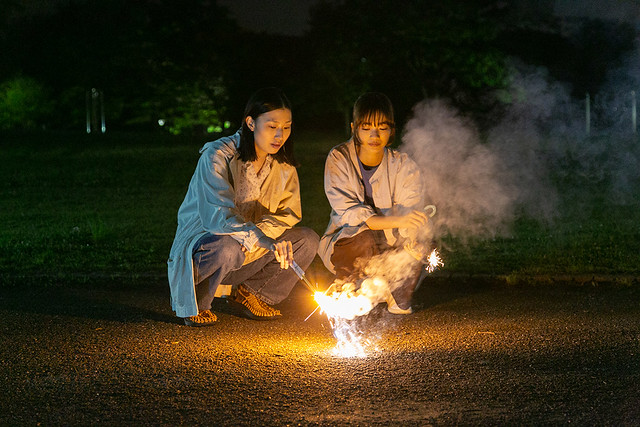 It's a warm spring day. A group of musicians are leisurely rehearsing while sitting in the park lawn in Tama-shi, a quiet suburb of Tokyo. A key is missing from a small Casio keyboard player, and they can't continue. They disband for the day, and this is how Yui kiyohara's quietly enchanting, Remembering Every Night starts. The main thread involves a day in the life of three different women as their lives intersect and don't. Unhurriedly, in series of long takes, Kiyohara's second feature floats in its own delicate rhythm with warmth and longing, very much like the frangrant early summer air and sound of outdoors it portrays.
It's a warm spring day. A group of musicians are leisurely rehearsing while sitting in the park lawn in Tama-shi, a quiet suburb of Tokyo. A key is missing from a small Casio keyboard player, and they can't continue. They disband for the day, and this is how Yui kiyohara's quietly enchanting, Remembering Every Night starts. The main thread involves a day in the life of three different women as their lives intersect and don't. Unhurriedly, in series of long takes, Kiyohara's second feature floats in its own delicate rhythm with warmth and longing, very much like the frangrant early summer air and sound of outdoors it portrays.
The three loosely interwoven stories meet and go separate ways naturally, complimenting each other and adding layer and texture of lived human experiences. The first thread of the story features an unnamed middle-aged, unemployed woman's (mis)adventure, getting lost. We observe the woman as she does her daily shores - getting groceries, visiting an unemployment office, looking through mails and other items. Through the conversations she engages in with others, we get her background a little and the modern Japanese society in a nutshell: she used to be a kimono dresser who was let go because of economic downturn and the loss of people's interest in traditions. This quiet, unassuming woman is quite lost (figuratively and literally) in what she wants to do - jobs that the unemployment office suggests - a salesclerk, a receptionist at a company, et cetera, don't appeal to her. While sorting through her mail, one of her neighbor's postcards announcing their move to their new home, becomes her destination for the day. But she becomes helplessly lost in an unfamiliar neighborhood soon enough.
While on her way to an wild goose chase, our middle-aged heroine encounters a couple of kids trying to get their unseen shuttlecock stuck in the tree in front of a housing complex for the elderly. She tries to get it down using the badminton racket to no avail, then she starts to climb uo the tree. The kids lose their interests and leave her on the tree. This tiny, almost insignificant scene is observed by a local gas meter reader, doing her rounds in the neighborhood. These transitions - the shift of focus, occur naturally and seamlessly in Remembering Every Night. Then, this young municipal worker is called upon by one of the elder residents of the building, being chatty while putting her laundry to dry on her balcony. An elderly resident has gone missing. Would the municipal worker be on the lookout for him? The elderly woman requests while handing her a bag full of mandarin oranges. The municipal worker soon finds the said elderly man lost in the neighborhood, mistaking other people's houses for his own. Here, Kiyohara gently addresses the nation's aging population and loneliness.
Then we go back to the lost woman in her adventure story. She sees a young woman practicing dance moves in the park in the distance. She unconsciously mimics the dance moves of the young woman - one of the many slight comic moments of the film, as she passes through the park field. Then the film's focus shifts again to the young woman, a university student in her final year, on her way to visit her dead boyfriend's parents, to hand them the receipt for a film roll that was never picked up from the film developing lab. The mother of the dead boyfriend suggests for her to pick up and keep the photos herself.
Remembering Every Night captures the unseen-world of delicate web that connects us all together. The film's very much in the same vein as Hamaguchi Ryusuke's 2021 crowd pleaser, Wheel of Fortune and Fantasy but from a different, quieter, less punctuated angle. The film's nostalgic tone, imbued with contemplation of time, memories, loss of memories and longing, lingers long after its credits roll.